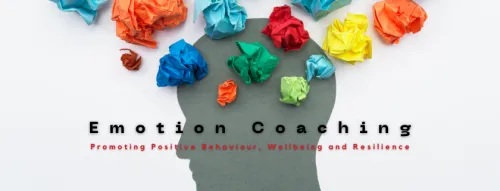EMOTION COACHING | In-house Training
- Wednesday 31 December 2025
- 9:00 am - 4:00 pm
- Your location
| Customer Rating | 4.84 out of 5 ⭐ |
|---|---|
| CPD Hrs | 7 |
| Includes | Handbook and certificate |
In-house training: If you have a group of staff we can arrange training at your workplace. Email us.
Emotion Coaching in everyday interactions with children and young people
Emotion Coaching is an evidence-based, relational approach that promotes emotional well-being through attuned relationships and co-regulation strategies. Rooted in clinical family work, it is grounded in the principle that emotions drive behavior. First identified by John Gottman, Emotion Coaching reflects a natural communication style where parents guide children to manage emotions effectively. Research shows that children who receive Emotion Coaching excel academically, are more popular, exhibit fewer behavioral issues, have better physical health, and demonstrate greater emotional stability and resilience.
Extensive studies have identified adult responses that foster emotional health in children. Emotion Coaching leverages moments of intense emotion and behavior as opportunities to teach children more effective responses. While inappropriate behaviors are not excused, they are addressed calmly and rationally once the child is settled, focusing on problem-solving and solution-oriented strategies. Through consistent, empathetic engagement, adults validate and acknowledge the child’s emotional state, fostering a sense of security and feeling “felt.” This process supports neurological changes that help the child calm down both physically and psychologically.
Key Elements of Emotion Coaching:
- Noticing the child’s emotions.
- Viewing emotions as opportunities for connection and teaching.
- Listening empathetically and validating feelings.
- Helping the child label their emotions.
- Setting boundaries while exploring solutions to the issue.
These strategies can be adopted by parents, educators, or anyone interacting with children and young people struggling with emotional regulation. Emotion Coaching has proven highly effective in primary and secondary schools and community settings. Emotion Coaching UK (ECUK) adapted Gottman’s five elements into a four-step, school-friendly framework to build emotional resilience, empathy, and problem-solving skills. Following successful pilots in UK schools and early childhood settings, this approach has been shared with education professionals, health and social care workers, educational psychologists, and GPs across the UK, Europe, Asia, and Australia.
The workshop includes evidence-based research and practical tips, with signposting to resources, case studies and vignettes to illustrate its practical application in parenting support and educational settings. It supports adults to promote empathetic responses to challenging behaviours and situations, helping children and young people to understand their emotions and learn to manage them and their behaviour in the longer-term. The workshop covers the following:
-
Critical overview of recent neuroscientific evidence on how best to support children and young people’s self-regulation
-
Insights into the stress-response and social engagement systems, attachment and the foundations for emotional regulation, positive behaviour and well-being
-
Research for evidence-based Emotion Coaching practice
-
Practical exercises and skill development in Emotion Coaching techniques
Audience: for Education and Mental Health Professionals at All Levels & Any Professional that Applies Behavioural & Developmental Science to their Practice.
Education Professionals: All education professionals who work with children or youth including, but not limited to K–12 Classroom Teachers, School Counsellors, Learning Assistance/Resource Teachers, School Administrators, School Paraprofessionals including Special Education Assistants, Classroom Assistants and Early Childhood Workers and all other professionals who support behavioural challenges and complex learning needs.
Mental Health Professionals: All mental health professionals including, but not limited to Counsellors, Psychologists, Psychotherapists, Psychiatrists, Social Workers, Nurses, Occupational Therapists, Youth Workers, Mental Health Workers, Family Therapists, General Practitioners, and all other mental health professionals looking to enhance their therapeutic skills.
Parents/carers: Parents and caregivers are welcome to attend. We ask that questions of a personal nature be asked to the trainer during break times.














